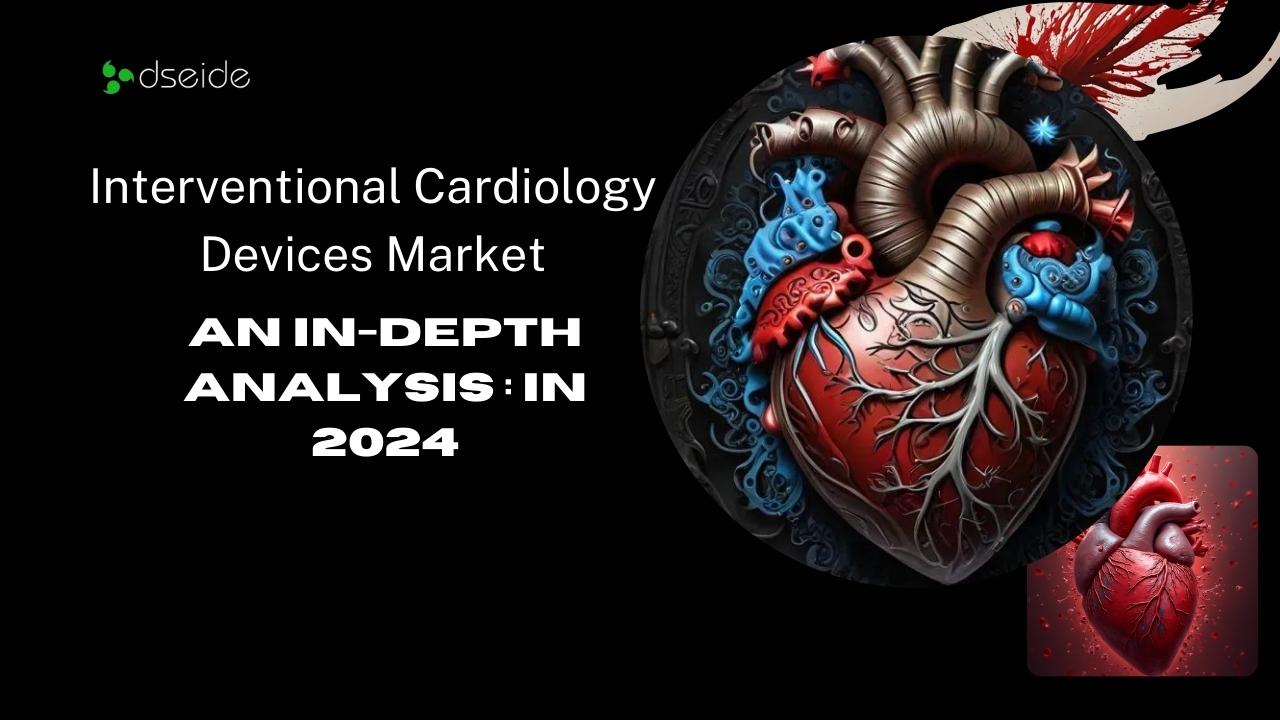Interventional Cardiology Devices Market An In-Depth Analysis : in 2024

Overview of Interventional Cardiology Devices
Interventional cardiology involves using minimally invasive techniques and devices to diagnose and treat cardiovascular diseases, such as coronary artery disease, heart valve disorders, and congenital heart defects. These devices, including stents, balloons, catheters, and plaque modification tools, are designed to reduce the need for open-heart surgery, thereby minimizing patient recovery time, risk, and healthcare costs.
Market Segmentation and Key Products
The interventional cardiology devices market is broadly segmented into various product categories:
Angioplasty Balloons:
-
- Old/Normal Balloons: Standard balloons used in angioplasty procedures to widen narrowed or blocked arteries.
- Drug-Eluting Balloons: Balloons coated with medication to help prevent restenosis or re-narrowing of the arteries post-procedure.
- Cutting and Scoring Balloons: Specialized balloons that help modify plaque before stenting, ensuring a more effective treatment.
Market Dynamics
Drivers:
Rising Prevalence of Cardiovascular Diseases:
The increasing incidence of cardiovascular conditions like coronary artery disease, valvular heart diseases, and atrial stenosis in developing countries such as China, India, and Brazil is a major driver of demand for interventional cardiology devices. The growing aging population and lifestyle changes contribute to this rise in cardiovascular conditions, creating a larger patient pool requiring minimally invasive treatments.
Technological Advancements and Innovation:
Leading medical device companies are investing heavily in research and development to create innovative products. Collaborative efforts among major players to conduct clinical trials and bring advanced devices to the market are accelerating growth. Additionally, regulatory agencies are increasingly approving domestically produced interventional devices in developing nations, further propelling market expansion.
Post-Pandemic Recovery in Elective Surgeries:
The COVID-19 pandemic initially had a negative impact on the market due to the postponement of elective surgeries. However, as healthcare systems have recovered, there has been a significant increase in interventional procedures, including coronary surgeries, which is expected to boost the market.
Challenges:
Impact of COVID-19:The market faced substantial disruption in 2020 due to the COVID-19 pandemic, which led to the postponement of elective surgeries worldwide. However, the market showed strong recovery signs in 2021, as elective surgeries resumed and interventional therapies gained preference due to their non-invasive nature and lower risk of infection.
High Cost of Devices and Procedures:
The cost of advanced interventional cardiology devices and procedures can be prohibitive, particularly in low-income countries, which may limit their adoption.
North America:
North America is expected to maintain the highest market share due to the prevalence of coronary heart disease and the presence of major manufacturers focused on developing innovative technologies. The region’s strong healthcare infrastructure, coupled with increasing awareness and early diagnosis, contributes to its market dominance.
Europe:
Europe is another significant market due to the relatively lower cost of interventional devices and an increasing number of coronary illness diagnoses and treatments. The region’s well-established healthcare systems and supportive regulatory frameworks also play a role in its market growth.
Recent Developments
Abbott's Acquisition of Cardiovascular Systems Inc. (CSI):
In February 2023, Abbott acquired Cardiovascular Systems Inc., a company specializing in interventional treatment devices for peripheral and coronary artery disease, for approximately $890 million. This acquisition is expected to enhance Abbott’s product portfolio in the interventional cardiology space.
Medtronic’s Launch of the Chameleon PTA Balloon Catheter:
In March 2021, Medtronic announced the commercialization of their Chameleon Percutaneous Transluminal Angioplasty (PTA) balloon catheter in various countries. This device allows the administration of diagnostic or therapeutic fluids directly through the integrated injection port, enhancing procedural efficiency.
Future Outlook and Opportunities
The global interventional cardiology devices market is set to witness substantial growth in the coming years. Key factors include rising cardiovascular disease rates, a growing aging population, and a shift towards minimally invasive surgical procedures. The post-pandemic preference for non-invasive treatments, coupled with technological advancements and increased healthcare investments, will continue to drive market expansion.



